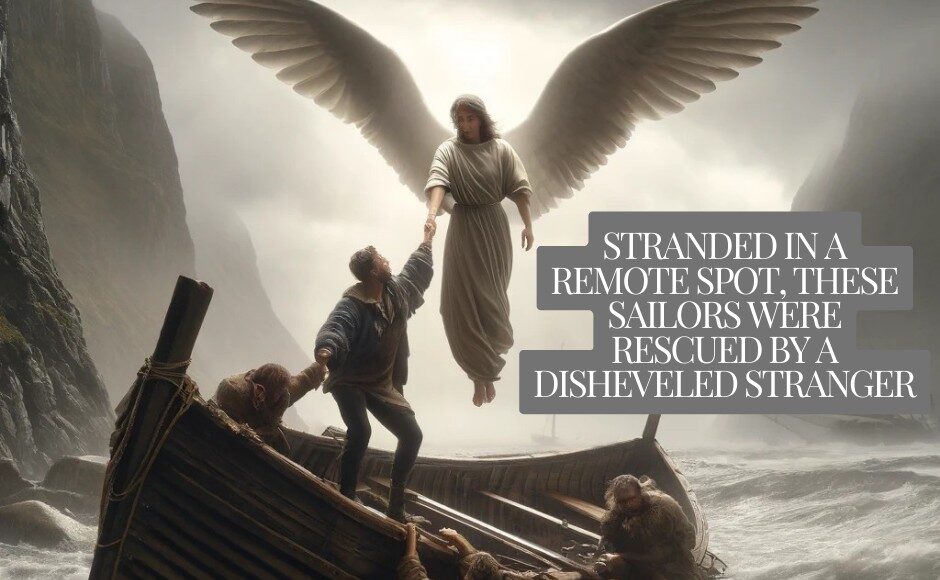His name, he said, was Nuke. Of course, I thought. He sure looked the part—a regular nuclear meltdown. His pants and shirt were disheveled. It seemed as if he hadn’t shaved—or bathed—in days. He tied up his old boat next to ours. Just the sight of him made me uneasy. Here we are, Bill and I, stranded on an old wooden dock in the middle of a remote state forest on Lake Michigan, with a crippled sailboat and no electricity or phone. Now comes this crazy person on top of everything else!
Much as we needed help, we weren’t that desperate. Or were we? Bill seemed to think so. After telling Nuke about our engine problems, Bill actually invited him aboard and into the cabin below! Not wanting to make a scene, I pivoted and headed off the dock.
“Where are you going, honey?” Bill asked me.
“I thought I’d go visit the ghost town,” I answered. The park housed an old iron-ore company town that had been well preserved and partially restored. It would give me time alone to think about how to get out of this mess, and to pray. After all, prayer had gotten us this far.
Bill and I were far from expert sailors. We’d purchased our 36-foot Catalina a few years earlier, christening her the Rose of Sharon. Since then, we’d taken a number of short trips around Lake Michigan. Even though Bill liked to be called Captain Bill at the helm, he and I had a lot to learn.
That was clear on the first day of this trip, our longest adventure to date—80 nautical miles to Fayette State Park. Not long after we’d left our home port, Menominee, Michigan, on the shore of Green Bay, the sky turned dark, the waves and whitecaps grew and the wind picked up till it howled. There had been rain and strong winds forecast, but we weren’t prepared for their ferocity. We ducked below for cover.
Should we keep going or head for safe harbor? A National Weather Service bulletin declaring a small craft advisory made up our mind.
“Escanaba’s not far away if we can make it,” Bill said. He drew down the sails, turned on the engine and pointed us to shore. As the Rose of Sharon fought through the chop, I prayed for our safety.
The prayer was answered. We made it to port. After Captain Bill gassed up the engine, we went below again, safe and snug, cooked up some dinner, brewed hot coffee and listened to the music of the rain and wind above.
The next morning, we awoke to a beautiful midsummer day. The sky was as clear as could be. We set sail after breakfast across Green Bay and onto the waters of western Lake Michigan. Twenty miles left to our destination. For the first hour or so, we were in heaven. The sun shone; the lake sparkled. We were in no hurry. There wasn’t a place we would rather be, just the two of us on the Rose of Sharon.
Then the wind, which had carried us along at a steady but gentle pace, suddenly died. Died completely. We sat motionless for an hour, till finally Captain Bill said, “If we want to get going, we’d better start the motor.”
The engine coughed, and the sailboat shuddered. My husband and I looked at each other.
“I know I pumped in enough gas, so that can’t be the problem,” Captain Bill said.
The engine coughed again, then shut down. Every attempt to start it failed. Finally my husband turned to me, his face sagging. “I think I know what’s wrong,” he said and raced to the bow.
I followed. When I reached him, he was holding the gas cap. He had been in such a rush to fill up the tank the night before to get out of the rain, he had forgotten to fasten the cap back on. Now the boat motor was flooded. “How could I be so stupid?” he said.
For the second time on this trip, I prayed. “Lord, get us to Fayette State Park safely,” I pleaded aloud. Captain Bill turned the ignition key. Nothing. Turned it again. Same result. I repeated my prayer. “Try it one last time,” I begged.
The engine stuttered, then came to life. My husband’s eyes widened in amazement and relief. Another prayer was answered!
We headed toward the state park, hoping the engine would keep working till then. For two hours, we kept our vigil, till the park’s dock at last came into sight. Just a few minutes more. Somehow the propellers kept turning till the moment we bumped against the dock…. Then the engine choked and died.
“You should have prayed for us to get to the park and back,” Captain Bill said. He was right. We weren’t out of the woods; we were in them, literally—the shoreline we faced was a limestone bluff covered by forest. We were totally stranded. No one around except, now, this strange, shabby fellow named Nuke, who had just appeared out of nowhere.
I wandered through the empty streets of the ghost town, past the big white house where the ore company’s superintendent had once lived, past the cone-shaped kilns and the weathered brick foundation of the furnace complex. Walking among the white birch trees, I prayed again desperately. Why would God get us here, only to abandon us? Why answer one prayer and not another? Why did we even think we could manage a trip like this? Maybe I believed in prayer too much.
I headed back, hoping that Nuke had shoved off. But his old boat was still there. As I neared the dock, I heard a sound. Our engine! Purring like new.
Nuke and Captain Bill emerged from belowdecks. “How did you ever fix it?” I asked, looking at the stranger in a whole new way.
“Well, ma’am, I’m a retired nautical engineer,” Nuke told me. “This engine in your boat? Believe it or not, I designed it.”
Believe it? Of course I did.













